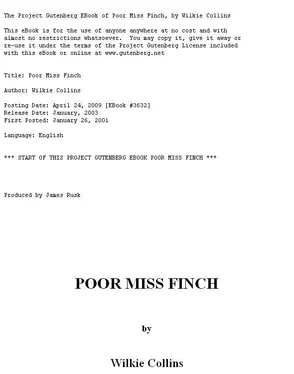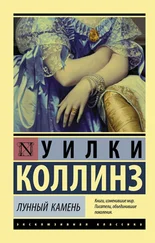Уилки Коллинз - Poor Miss Finch
Здесь есть возможность читать онлайн «Уилки Коллинз - Poor Miss Finch» весь текст электронной книги совершенно бесплатно (целиком полную версию без сокращений). В некоторых случаях можно слушать аудио, скачать через торрент в формате fb2 и присутствует краткое содержание. Год выпуска: 2002, Жанр: Классическая проза, на английском языке. Описание произведения, (предисловие) а так же отзывы посетителей доступны на портале библиотеки ЛибКат.
- Название:Poor Miss Finch
- Автор:
- Жанр:
- Год:2002
- ISBN:нет данных
- Рейтинг книги:3 / 5. Голосов: 1
-
Избранное:Добавить в избранное
- Отзывы:
-
Ваша оценка:
- 60
- 1
- 2
- 3
- 4
- 5
Poor Miss Finch: краткое содержание, описание и аннотация
Предлагаем к чтению аннотацию, описание, краткое содержание или предисловие (зависит от того, что написал сам автор книги «Poor Miss Finch»). Если вы не нашли необходимую информацию о книге — напишите в комментариях, мы постараемся отыскать её.
Poor Miss Finch — читать онлайн бесплатно полную книгу (весь текст) целиком
Ниже представлен текст книги, разбитый по страницам. Система сохранения места последней прочитанной страницы, позволяет с удобством читать онлайн бесплатно книгу «Poor Miss Finch», без необходимости каждый раз заново искать на чём Вы остановились. Поставьте закладку, и сможете в любой момент перейти на страницу, на которой закончили чтение.
Интервал:
Закладка:
This was my reward for all the trouble that I had taken to discover Oscar Dubourg! Never mind the money I had spent—I am not rich enough to care about money—only consider the trouble. If I had been a man, I do really think I should have knocked him down. Being only a woman, I dropped him a low curtsey, and stung him with my tongue.
"As you please, sir," I said. "I have done my best to serve you—and you quarrel with me and leave me, in return. Go! You are not the first fool who has quarreled with his best friend."
Either the words or the curtsey—or both together—brought him to his senses. He made me an apology—which I received. And he looked excessively foolish—which put me in an excellent humour again. "You stupid boy," I said, taking his arm, and leading him to the stairs. "When we first met at Dimchurch did you find me a suspicious woman or an inhuman woman? Answer me that!"
He answered frankly enough.
"I found you all that was kind and good. Still, it is surely only natural to want some confirmation——" He checked himself there, and reverted abruptly to my letter to Mrs. Finch. The silence of the rector's wife evidently alarmed him. "How long is it since you wrote?" he inquired.
"As long ago as the first of this month," I replied.
He fell into thought. We ascended the next flight of stairs in silence. At the landing, he stopped me, and spoke again. My unanswered letter was still uppermost in his mind.
"Mrs. Finch loses everything that can be lost," he said. "Is it not likely—with her habits—that when she had written her answer, and wanted your letter to look at to put the address on it, your letter was like her handkerchief or her novel, or anything else—not to be found?"
So far, no doubt, this was quite in Mrs. Finch's character. I could see that—but my mind was too much pre-occupied to draw the inference that followed. Oscar's next words enlightened me.
"Have you tried the Poste-Restante?" he asked.
What could I possibly have been thinking of! Of course, she had lost my letter. Of course, the whole house would be upset in looking for it, and the rector would silence the uproar by ordering his wife to try the Poste-Restante. How strangely we had changed places! Instead of my clear head thinking for Oscar, here was Oscar's clear head thinking for Me. Is my stupidity quite incredible? Remember, if you please, what a weight of trouble and anxiety had lain on my mind while I was at Marseilles. Can one think of everything while one is afflicted, as I was? Not even such a clever person as You can do that. If, as the saying is, "Homer sometimes nods"—why not Madame Pratolungo?
"I never thought of the Poste-Restante," I said to Oscar. "If you don't mind going back a little way, shall we inquire at once?"
He was perfectly willing. We went downstairs again, and out into the street. On our way to the post-office, I seized my first opportunity of making Oscar give me some account of himself.
"I have satisfied your curiosity, to the best of my ability," I said, as we walked arm-in-arm through the streets. "Now suppose you satisfy mine. A report of your having been seen in a military hospital in Italy, is the only report of you which has reached me here. Of course, it is not true?"
"It is perfectly true."
"You, in a hospital, nursing wounded soldiers?"
"That is exactly what I have been doing."
No words could express my astonishment. I could only stop, and look at him.
"Was that the occupation which you had in view when you left England?" I asked.
"I had no object in leaving England," he answered, "but the object which I avowed to you. After what had happened, I owed it to Lucilla and I owed it to Nugent to go. I left England without caring where I went. The train to Lyons happened to be the first train that started on my arrival at Paris. I took the first train. At Lyons, I saw by chance an account in a French newspaper of the sufferings of some of the badly-wounded men, left still uncured after the battle of Solferino. I felt an impulse, in my own wretchedness, to help these other sufferers in their misery. On every other side of it, my life was wasted. The one worthy use to which I could put it was to employ myself in doing good; and here was good to be done, I managed to get the necessary letters of introduction at Turin. With the help of these, I made myself of some use (under the regular surgeons and dressers) in nursing the poor mutilated, crippled men; and I have helped a little afterwards, from my own resources, in starting them comfortably in new ways of life."
In those manly and simple words, he told me his story.
Once more I felt, what I had felt already, that there were hidden reserves of strength in the character of this innocent young fellow, which had utterly escaped my superficial observation of him. In choosing his vocation, he was, no doubt, only following the conventional modern course in such cases. Despair has its fashions, as well as dress. Ancient despair (especially of Oscar's sort) used to turn soldier, or go into a monastery. Modern despair turns nurse; binds up wounds, gives physic, and gets cured or not in that useful but nasty way. Oscar had certainly struck out nothing new for himself: he had only followed the fashion. Still, it implied, as I thought, both courage and resolution to have conquered the obstacles which he must have overcome, and to have held steadily on his course after he had once entered it. Having begun by quarreling with him, I was in a fair way to end by respecting him. Surely this man was worth preserving for Lucilla, after all!
"May I ask where you were going, when we met at the port?" I continued. "Have you left Italy because there were no more wounded soldiers to be cured?"
"There was no more work for me at the hospital to which I was attached," he said. "And there were certain obstacles in my way, as a stranger and a Protestant, among the poor and afflicted population outside the hospital. I might have overcome those obstacles, with little trouble, among a people so essentially good-tempered and courteous as the Italians, if I had tried. But it occurred to me that my first duty was to my own countrymen. The misery crying for relief in London, is misery not paralleled in any city of Italy. When you met me, I was on my way to London, to place my services at the disposal of any clergyman, in a poor neighborhood, who would accept such help as I can offer him." He paused a little—hesitated—and added in lower tones:—"That was one of my objects in returning to England. It is only honest to own to you that I had another motive besides."
"A motive connected with your brother and with Lucilla?" I suggested.
"Yes. Don't misinterpret me! I am not returning to England to retract what I said to Nugent. I still leave him free to plead his own cause with Lucilla in his own person. I am still resolved not to distress myself and distress them, by returning to Dimchurch. But I have a longing that nothing can subdue, to know how it has ended between them. Don't ask me to say more than that! In spite of the time that has passed, it breaks my heart to talk of Lucilla. I had looked forward to a meeting with you in London, and to hearing what I longed to hear, from your lips. Judge for yourself what my hopes were when I first saw your face; and forgive me if I felt my disappointment bitterly, when I found that you had really no news to tell, and when you spoke of Nugent as you did." He stopped, and pressed my arm earnestly. "Suppose I am right about Mrs. Finch's letter?" he added. "Suppose it should really be waiting for you at the post?"
"Well?"
"The letter may contain the news which I most want to hear."
I checked him there. "I am not sure of that," I answered. "I don't know what it is that you most want to hear."
Читать дальшеИнтервал:
Закладка:
Похожие книги на «Poor Miss Finch»
Представляем Вашему вниманию похожие книги на «Poor Miss Finch» списком для выбора. Мы отобрали схожую по названию и смыслу литературу в надежде предоставить читателям больше вариантов отыскать новые, интересные, ещё непрочитанные произведения.
Обсуждение, отзывы о книге «Poor Miss Finch» и просто собственные мнения читателей. Оставьте ваши комментарии, напишите, что Вы думаете о произведении, его смысле или главных героях. Укажите что конкретно понравилось, а что нет, и почему Вы так считаете.






